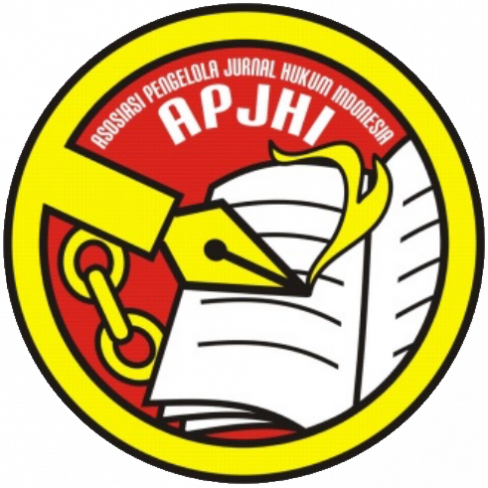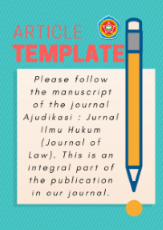Restorative Justice Bagi Anak Pelaku Tindak Pidana Pembunuhan dalam Perspektif Pidana Islam
DOI:
https://doi.org/10.30656/ajudikasi.v2i1.575Abstract
The settlement of criminal cases by using the punishment method for the perpetrators (retributive) is not effective enaough and it is not become deterrent for the perpetrators but they more expert in doing criminal acts, moreover the perpetrators are children under the age that they are unstable in psychiatric and very easy to imitate the negative behavior gained in jail. Many methods of punishment offered by experts to change conventional punishment methods one of them is using the Restorative Justice, the concept of punishment is by involving the victim's family efforts not only focus on giving suffering to the perpetrator but also healing the injuries suffered by the victim and the victim's family. This study focuses on the concept of Restorative Justice for children involved in criminal acts of murder in Islamic criminal studies, and find the differences in the application of Restorative Justice in the provision of a positive legal system in Indonesia with Islamic criminal law.
Downloads
References
Ali, Zainuddin. 2012. Hukum Pidana Islam, Cet.3. Jakarta; Sinar Grafika
Atmasasimita, Romli. 1993. Problem Kenakalan Anak-anak Remaja. Bandung; Armico
Audah, Abdul Qadir. At-Tasyir’ Al-Jinaiy Al-Islamiy, Juz I. Beirut; Dar Al-Kitab Al-A’rabi
___________. 2008. Enslikopedi Hukum Pidana Islam, BK 111 terj. Indonesia, Bogor; Kharisma Ilmu
Az-zuhaili, Wahbah. Al-Fiqh Islami wa Adilatuhu, Terj. Indonesia, Jakarta; Gema Insani
Dahlan, Abdul Azis. 1996. Ensikpoledi Hukum Islam, Jakarta; Ichtiar Baru
Hadikusuma, Hilman. 2005. Bahasa Hukum Indonesia. Bandung; Alumni
Hanafi, Ahmad. 1990. Asas-asas Hukum Pidana Islam, Jakarta; Bulan Bintang
Hanafi, A. 1994. Asas-asas Hukum Pidana, Jakarta; PT. Rineka Cipta
Kartono, Kartini. 1988. Psikologi Remaja. Bandung; Rosda Karya
Munawwir, Ahmad Warson. Kamus Al-Munawwir Arab-Indonesia Terlengkap, Malang; Pustaka Progresif
Suherman, Ade Maman dan Satrio J, 2010. Penjelasan Hukum tentang Bataan Umur. Jakarta; Gramedia
Soekanto, Soerjono. 1997. Pokok-pokok Sosiologi Hukum, Jakarta; Raja Grafindo
Sodikin, Ali. 2015. Restorative Justice dalam tindak pidana Pembunuhan; Perspektif hukum pidana Indonesia dan Hukum Pidana Islam pada Jurnal (Asy-Syir’ah) Jurnal Ilmu Syariah dan Ilmu Hukum Uin Sunan Kalijaga Yogyakarta
UNDANG-UNDANG
KUHP dan KUHAP
Undang-Undang No 11 Tahun 2012 tentang Sistem Peradilan Pidana Anak
WEBSITE;
Nur, Muhammad. 1990. Tindak Balas Dendam dalam Islam (Perspektif Dokriner Cum Filosofis) dalam Jurnal Jinayah HMJ JS Sunan Kalijaga Jogjakarta
Rachmayanthy, Litmas Pengadilan Anak Berkaitan Dengan Proses Penyidikan, diperoleh pada tanggal 21 Desember 2017 dari sumber; http://bimkemas.kemenkumham.go.id/attachments/article/247/LITMAS%20PENGADILAN%20ANAK%20BERKAITAN%20DENGAN%20PROSES%20PENYIDIKAN.pdf
Rozi, Fakhrul. Tindak Pidana Pembunuhan dalam KUHP. Diperoleh pada 10 Januari 2018 dari sumber; https://www.suduthukum.com/2014/05/tindak-pidana-pembunuhan-dalam-kuhp.html
Setyowati, Sulis. Tindak Pidana Anak, diperoleh pada tanggal 19 Februari 2018 dari sumber; https://slissety.wordpress.com/tindak-pidana-anak/.
Soleh, Nur Amin. Sejarah Perkembangan Restorative Justice diperoleh pada 19 februari 2018 dari sumber; https://nuraminsaleh.blogspot.co.id/2016/02/sejarah-perkembangan-restorative-justice.html
Downloads
Published
Issue
Section
License
Authors who publish with this journal agree to the following terms:
Authors retain copyright and grant the journal right of first publication with the work simultaneously licensed under a Creative Commons Attribution License that allows others to share the work with an acknowledgment of the work's authorship and initial publication in this journal.
Authors can enter into separate, additional contractual arrangements for the non-exclusive distribution of the journal's published version of the work (e.g., post it to an institutional repository or publish it in a book) with an acknowledgment of its initial publication in this journal.
Authors are permitted and encouraged to post their work online (e.g., in institutional repositories or on their website) before and during the submission process, as it can lead to productive exchanges and earlier and greater citation of published work.
All articles in Ajudikasi : Jurnal Ilmu Hukum can be disseminated provided they include the identity of the article and the source of the article (Ajudikasi : Jurnal Ilmu Hukum). The publisher is not responsible for the contents of the article. The content of the article is the sole responsibility of the author
Ajudikasi : Jurnal Ilmu Hukum is lincensed under a Creative Commons Attribution-ShareAlike 4.0 International License.










1.png)
.png)
.png)





.png)
.png)
.png)
.png)





.png)







